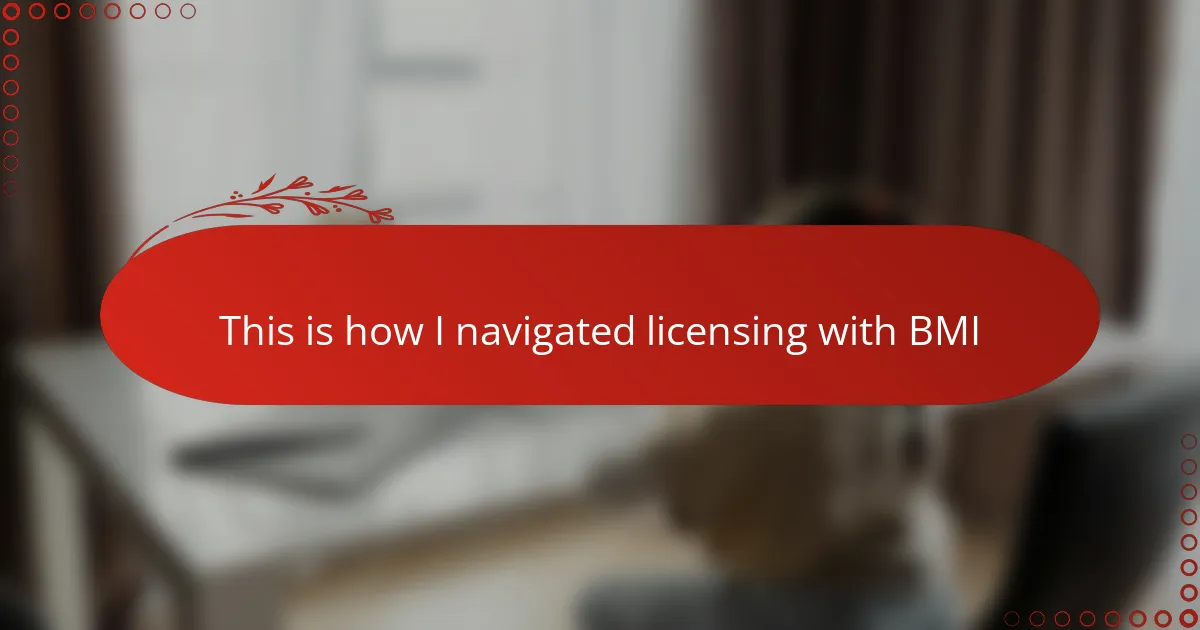Key takeaways
- BMI licensing simplifies the process of playing music legally by offering blanket licenses, covering all songs in their catalog without needing individual permissions.
- Understanding licensing terms enhances transparency and builds confidence in respecting artists’ rights and maintaining legal broadcasting.
- Effective communication with BMI ensures fair fees and supports adjustments based on changes in the station’s audience reach.
- Thoroughly engaging with licensing documents fosters clarity, turning complex jargon into manageable commitments for the station.
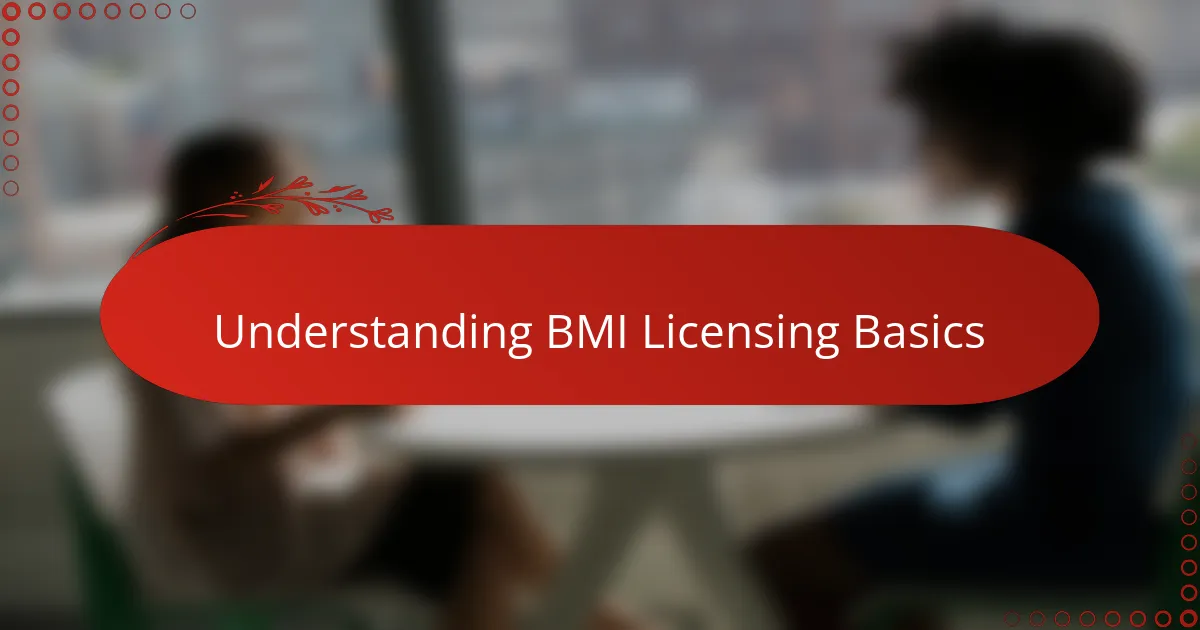
Understanding BMI Licensing Basics
Getting a grip on BMI licensing felt overwhelming at first, but I soon realized it’s really about securing permission to play a wide range of music legally. BMI, or Broadcast Music, Inc., manages rights for songwriters and publishers, so when I licensed through them, I was essentially bridging the gap between the music creators and my radio station. Have you ever wondered how your station stays on the right side of copyright? That’s exactly what BMI helps with.
One thing that stood out to me was how BMI offers blanket licenses, meaning you don’t have to clear every single song individually. This was a huge relief because, as someone running a station, tracking down permissions for thousands of songs would be impossible. The blanket license covers all the music in their catalog, which gave me peace of mind and allowed me to focus on programming.
Of course, understanding the specific terms and fees took some digging. I found myself asking, “How does BMI determine what I should pay?” Their licensing fees typically depend on factors like the size of your audience and the platform you use. Knowing this made the process feel more transparent and manageable, rather than a mysterious black box of legal jargon.
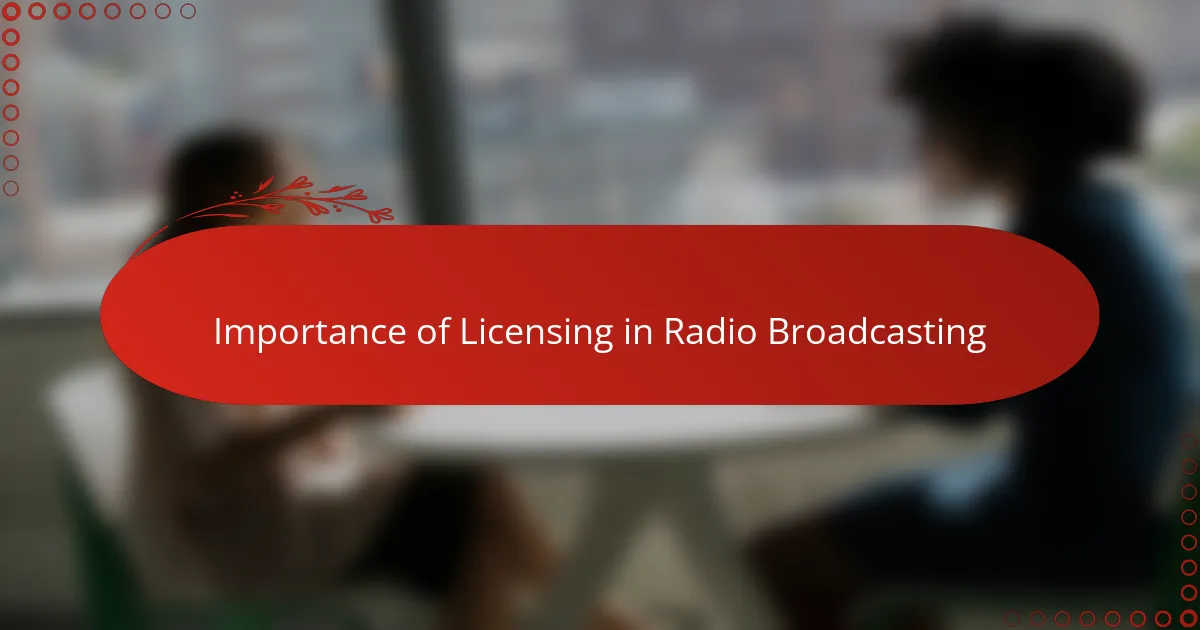
Importance of Licensing in Radio Broadcasting
Licensing is the backbone of responsible radio broadcasting. Without it, I would be playing music without permission, which felt not only risky but unfair to the artists whose work I love. Have you ever thought about how much effort goes into respecting creative rights behind the scenes? That respect is exactly what licensing ensures.
When I first grasped the importance of licensing, it hit me that it protects everyone involved—the artists, the station, and ultimately, the listeners. It’s a way of acknowledging the value of music beyond just entertainment. I found myself more connected to the industry, knowing I was contributing fairly to its ecosystem.
At the same time, licensing gave me confidence. Knowing my station had the right permissions meant I could focus on creating great content instead of worrying about legal pitfalls. Isn’t that peace of mind worth the effort? For me, it absolutely was, and it changed how I approached broadcasting.
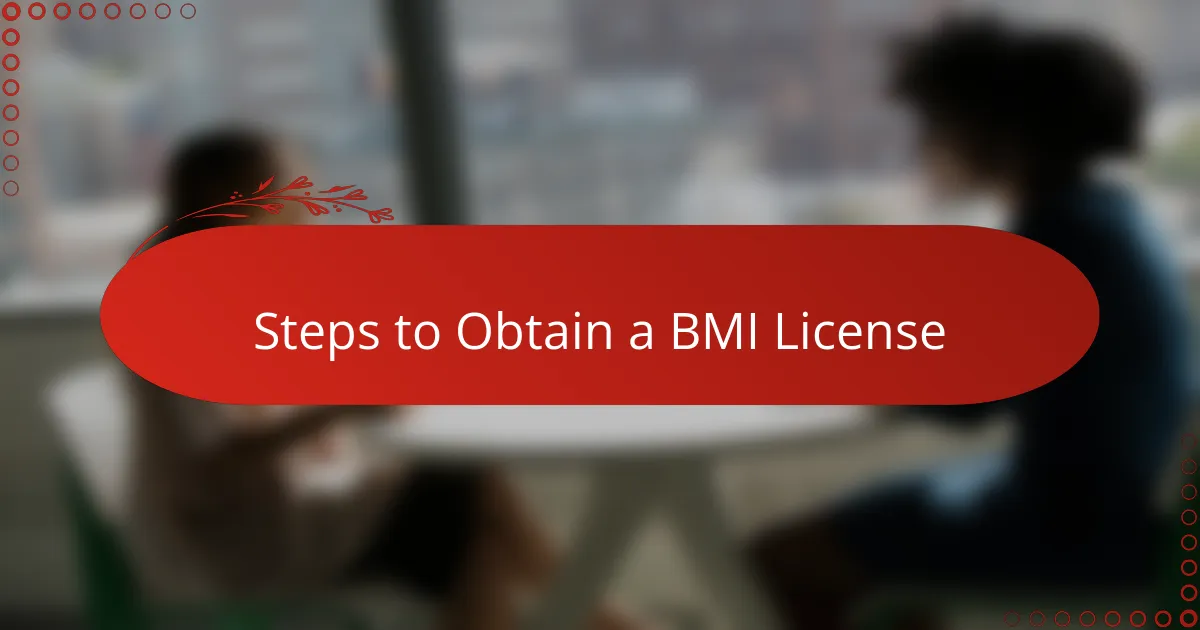
Steps to Obtain a BMI License
The first step I took was visiting BMI’s official website to gather all the relevant information. I filled out their application form carefully, making sure to provide details about my radio station’s size and broadcast reach. Have you ever had to fill out paperwork that seemed daunting at first? Surprisingly, this was straightforward once I broke it down.
Next, BMI’s team reached out to discuss my station’s specifics and the licensing fees. I remember feeling a bit anxious about the costs, but being informed about how they calculate fees based on audience size and platform really helped me understand what I was paying for. This transparency made me feel like I was entering into a fair partnership rather than just signing a contract.
Finally, after the agreement was in place and the fees settled, I received confirmation that my station was fully licensed. That moment brought a wave of relief—I could finally play music with confidence, knowing I was respecting the artists and protecting my station. Have you ever experienced that sense of accomplishment after navigating a complex process? For me, it was a small but significant victory.

Managing Licensing Costs and Fees
Navigating the costs with BMI felt like walking a tightrope at first. I worried whether my tight budget could handle the fees, but breaking them down based on audience size helped me see where my money was going. Have you ever been pleasantly surprised to find that something feared as expensive actually had a fair, transparent structure? That was my experience here.
What really helped me manage expenses was anticipating changes in my station’s reach and adjusting my budget accordingly. I learned that staying proactive with BMI about any growth or shifts kept my fees accurate and prevented surprise charges. It made me realize: isn’t it better to keep communication open rather than get hit with unexpected costs?
In the end, I treated licensing fees as an investment in my station’s future rather than just another bill. That mindset shift pushed me to prioritize these payments because they ensured the music I love could keep running legally. Would you agree that protecting your station’s reputation and supporting artists is worth that commitment? For me, there was no doubt.
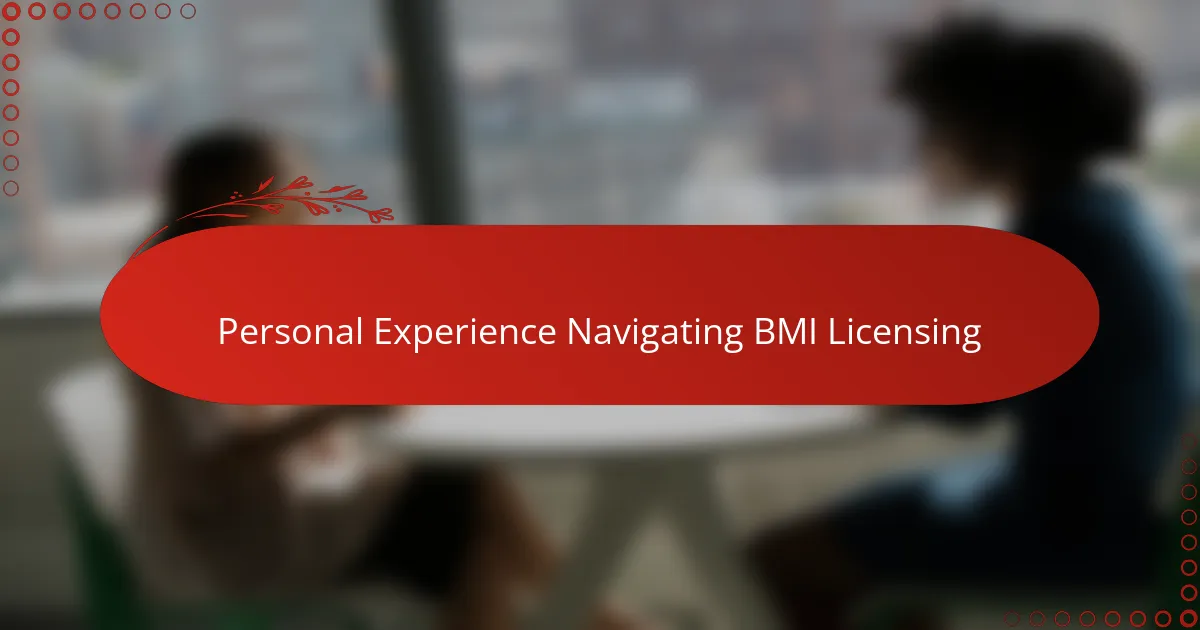
Personal Experience Navigating BMI Licensing
Navigating BMI licensing felt like stepping into uncharted territory, but I quickly discovered that the key was patience and asking the right questions. When I reached out to their representatives with detailed questions about my station’s unique setup, their responses were surprisingly clear and supportive. Have you ever been relieved by how helpful a supposedly complex process turned out to be? That’s exactly how I felt.
I won’t lie—figuring out the fine print on the licensing agreement required a few late nights of reading and reflection. But breaking down each clause and understanding what I was committing to gave me a sense of control. It wasn’t just paperwork anymore; it became a safeguard for everything I was building with my station. Did diving into the details like that ever transform anxiety into confidence for you? For me, it did.
One moment that stuck with me was when I realized that maintaining open communication with BMI wasn’t just smart—it was essential. Whenever my station grew or changed its format, a quick update ensured the licensing stayed accurate and fair. That ongoing dialogue felt like having a partner in the background, watching out for both the station and the artists. Don’t you think that kind of relationship makes all the difference in navigating legal waters? I certainly do.

Common Challenges and Solutions
One challenge I faced early on was decoding the complex legal language BMI uses in their licensing documents. It was tempting to skim through, but I quickly learned that those details mattered. Have you ever caught yourself zoning out during legal reads? Taking the time to dissect each clause turned confusion into clarity, making me feel more confident about what I was agreeing to.
Another hurdle was balancing the licensing fees with my station’s limited budget. I worried that the costs might spiral unexpectedly, but staying proactive and keeping an open line with BMI helped me avoid surprises. When my audience grew, I notified them promptly, which kept fees fair and manageable. Isn’t it reassuring when good communication prevents potential headaches?
Sometimes, the biggest struggle was simply knowing who to contact for help. BMI’s customer service turned out to be more approachable than I expected. Whenever I hit a roadblock, reaching out brought timely answers and eased my worries. Have you ever been pleasantly surprised by how supportive a big organization can be? That support made all the difference for me when navigating licensing challenges.
